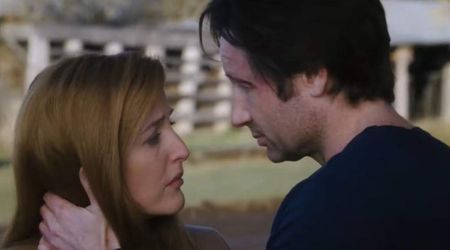'After Life' Season 2 Spoiler-Free Review: Ricky Gervais' dark comedy doesn't try hard and that's refreshing

The following review of ‘After Life’ Season 2 contains no spoilers.
Matt Spicer, who made ‘Ingrid Goes West’, said in a 2017 interview with Vox that “a good dark comedy is not afraid to be not funny”. That is, perhaps, both the strength and the weakness of the second season of Ricky Gervais’ six-part Netflix series, ‘After Life’.
Gervais’ character Tony, in the show, is an unhappy man. The death of his wife led him to turn caustic, nihilistic, and a bit of an a*****e. But he tries to be better. He tries to move on. He tries to not bite everyone’s heads off. And that’s because, underneath the crusty hard shell of a widower with a maddeningly mundane job, he is a sensitive man.
The second season of the show, just like the first, is a brief glance at the life of Tony and the kooky characters in his periphery. None of the characters exist only for comedic effect. They are all three-dimensional. They all nurse their own wounds. They are all Sisyphus, going through the day, one day at a time. Essentially, the show has heart.
But the fact that they aren’t props for comic relief doesn’t automatically mean they have been granted purpose in the story. There’s a dramatic device known as “Chekhov's gun”, named after the Russian playwright and author Anton Chekhov. It dictates that every element in a story must be necessary, and irrelevant elements should be removed. In its existence, ‘After Life’ mocks this device and for good reason.
‘After Life’ doesn’t aim to be a gripping story. And for something that is billed as a comedy, it doesn’t try hard in that department either. It aims to portray the life of a man who nurses his heartache and is afraid to let that heartache go, for he’s afraid to say goodbye to the last remaining essence of his dead wife.
Be it Tony or Matt (Tom Basden) or Lenny (Tony Way) or Roxy (Roisin Conaty ) or Pat (Joe Wilkinson), none of the characters feel like characters because there’s something unnervingly real about how they continue to lead their Sisyphean existences despite all that’s bad. It doesn’t need a “Chekhov’s gun” because life never has dramatic devices to move the story forth. It just moves ahead on its own.
And while this is beautiful in one aspect, taking realism so seriously, that it doesn’t shy away from being mundane, it is also its fatal flaw. What’s the point of telling a story that’s not a story at all? What’s the point of being a dark comedy when the comedy is nothing but the everyday absurdities of existence? What’s the point of being invested in the lives of Tony or any one of the others, when they don’t offer anything worthwhile?
That is not to say ‘After Life’ Season 2 is a bad watch. It most certainly isn’t. Tony’s foul-mouthed nihilism and Matt’s awkward attempts to hide his sadness, and Pat’s blissful ignorance, and more in six, swift episodes gets done even before you realize you spent three hours watching them.
People often read reviews, hoping for an answer that would help them figure out if a show or a film is good or bad, and if it’s worth watching. ‘After Life’, in two seasons, doesn’t even attempt to provide any answers for how to move on, for how to be happy. Why should then it’s review provide the answer to an unnecessary binary: good or bad?
‘After Life’ Season 2 airs on Netflix on April 24.










